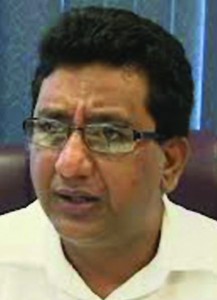
Attorney General Anil Nandlall on Tuesday concluded his argument on why Opposition Leader David Granger should not be included in the 2012 budget cuts case. He presented his submissions before Justices Rishi Persaud and James Bovell-Drakes at the High Court.
Granger was excluded from the case along with Finance Minister, Dr Ashni Singh in June by acting Chief Justice Ian Chang, who ruled that as members of the National Assembly, the Constitution provides immunity for them; however, the opposition leader subsequently appealed the decision.
Nandlall contended that the Constitution provides for no legal proceedings to be filed against them as members of the National Assembly. He disputed the opposition’s claims that they are entitled to waive their immunity, stating that there will be consequences.
“It (Constitution) prohibit suits against any member of the National Assembly… it is also not individual but collective, so when an individual relinquishes that protection, it can expose all other parliamentarians,” the attorney general pointed out.
Nandlall explained that for Granger to waive his immunity rights, a legislation would have to be passed to amend the current laws.
He also argued that the appeal has no merit while adding that the opposition leader suffered no adverse order, but is the beneficiary of an order which excludes him from the case.
“It is not negative, it did not cause him any disadvantage, it never caused him any disadvantage, any adverse consequences, in fact he has won the case and yet he appealed,” he told the media after the proceedings.

Meanwhile, Granger’s Attorney Basil Williams highlighted that the Constitution’s wording makes possible for the opposition leader to waive his immunity. The attorney, who previously made his submissions, reiterated his position that Granger should be included in the proceedings.
Tuesday’s session marked the end of submissions for the two counsels.
When the case resumes on December 19, the presiding judges will clarify issues in the submissions.
The case is related to the 2012 national budget, which was slashed by the parliamentary opposition, causing the government to take legal action on the basis that the opposition has no power to cut the budget, but to either approve or reject.
In April 2012, the combined parliamentary opposition used its one-seat majority to slash Gy$ 21.9 billion from the proposed Gy$ 192.8 billion in the 2012 national budget.
The government subsequently moved to the court to block the National Assembly from cutting the budget.
Justice Chang in a preliminary ruling said the opposition can only approve or disapprove of the budget in its entirety, and not make any changes; however, the opposition argued that the ruling is not binding or final and shaved off more than Gy$ 31.4 billion of the Gy$ 208.8 billion 2013 budget.
Chaos reigned when Speaker Raphael Trotman also proclaimed that the court had no oversight responsibility or powers over the legislature.



